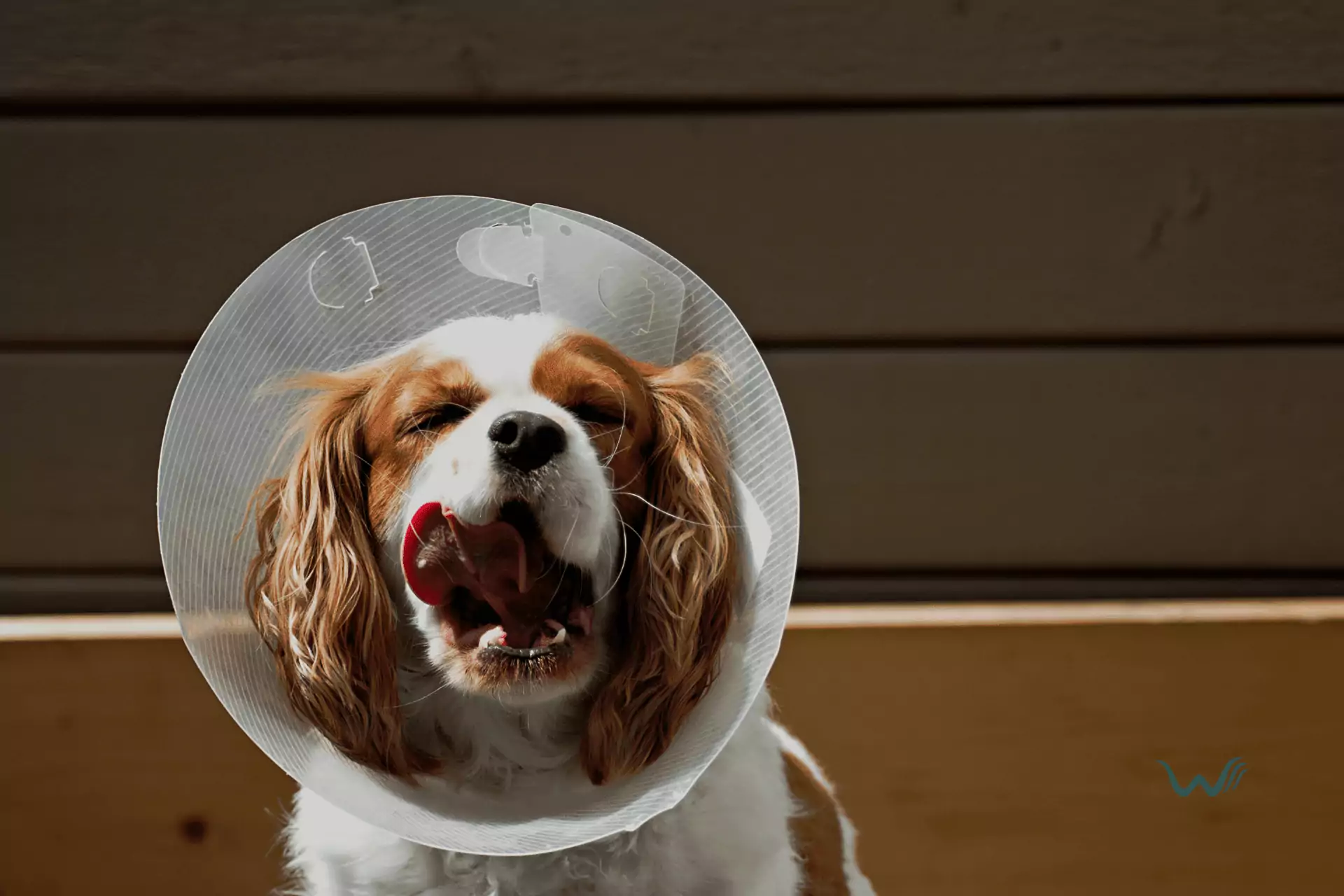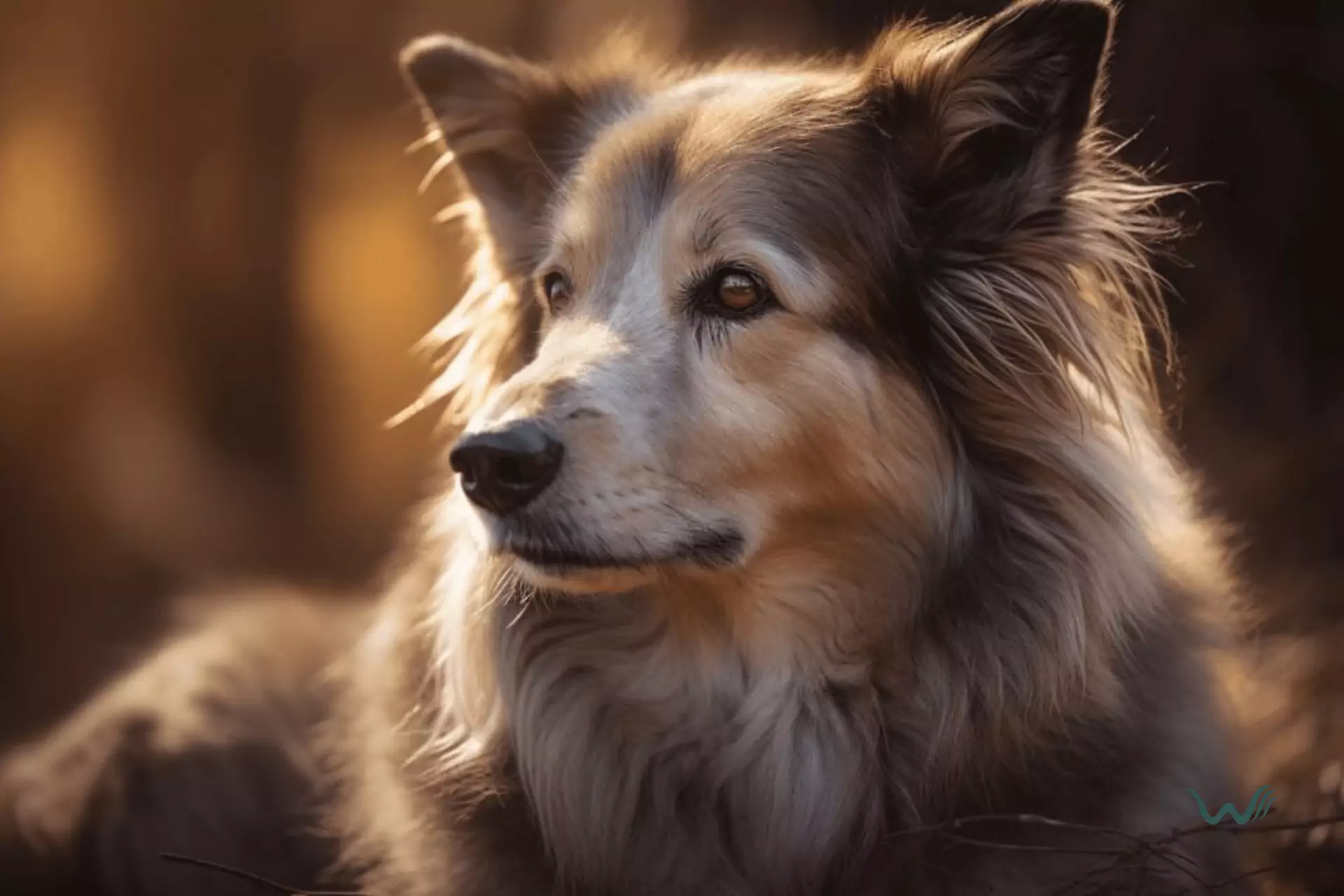

How Do I Prevent Dog Wound Licking?
by Haley Mills
Last updated: April 20, 2024
Verified and Approved by:
Angela Morris,
MSW, LCSW
Fact Checked

Do you have a furry friend who just can’t resist licking their wounds? While it may seem innocent enough, dog wound licking can actually be quite dangerous.
In this article, we will explore the reasons behind this behavior and provide you with tips on how to prevent it.
Understanding the dangers of wound licking in dogs is crucial in ensuring the well-being of your beloved pet. Dogs have a natural instinct to lick their wounds as a way to clean and soothe themselves. However, excessive licking can lead to a host of problems, including delayed healing, infection, and even the development of a lick granuloma.
To prevent these complications, you’ll need to identify the causes of wound licking and take appropriate measures to address them.
Understanding the Dangers of Wound Licking in Dogs
So, you already know that dogs have a natural instinct to lick their wounds, but did you know that this seemingly harmless behavior can actually be quite dangerous?
While licking wounds may provide some temporary relief and cleaning, it can also lead to a range of problems. One of the main dangers of wound licking is that it can delay the healing process. When a dog licks a wound, it introduces bacteria from its mouth, which can cause infection and further damage to the already injured area.
Additionally, excessive licking can lead to irritation, inflammation, and even the formation of a lick granuloma, a painful and difficult-to-treat wound caused by continuous licking.
To prevent dogs from licking their wounds, behavioral modifications can be implemented. First and foremost, keep an eye on your dog and redirect their attention whenever they start to lick their wound. This can be done by providing them with interactive toys or engaging them in activities that distract them from the wound.
Another approach is to use deterrents such as bitter-tasting sprays or bandages, which can discourage the dog from licking. Additionally, providing a comfortable and secure environment for your dog during the healing process may be helpful, as stress and anxiety can contribute to excessive licking.
In addition to behavioral modifications, natural remedies can also prevent dog wound licking. One option is to apply a bitter apple spray or ointment to the wound, as the bitter taste can discourage licking. Another natural remedy is an Elizabethan collar, commonly known as a “cone of shame.” This collar is designed to prevent dogs from reaching their wounds and licking them.
However, while these remedies can be effective, it’s always best to consult with a veterinarian before using them to ensure they’re safe and appropriate for your dog’s specific situation.
Identifying the Causes of Dog Wound Licking
To effectively address the issue of dog wound licking, understanding the underlying causes is essential. There are several reasons why dogs engage in this behavior.
One common cause is boredom or anxiety. Dogs may lick their wounds as a form of self-soothing or a way to occupy themselves when feeling anxious or bored.
Another cause could be pain or irritation. If a wound is painful or itchy, dogs may lick it to alleviate discomfort.
Be sure to identify the specific cause of wound licking to implement appropriate measures to prevent it.
To prevent dog wound licking, behavioral modifications can be helpful. Providing mental and physical stimulation through puzzle toys, interactive play, and regular exercise can help alleviate boredom and reduce the likelihood of wound licking.
Additionally, using positive reinforcement training techniques to redirect your dog’s attention away from the wound and onto alternative behaviors can be effective. For example, teaching your dog a “leave it” or “stay” command can help redirect their focus away from the wound.
In addition to behavioral modifications, natural remedies can also prevent dog wound licking. Applying a bitter-tasting deterrent spray or cream to the wound can discourage dogs from licking it.
There are also natural remedies such as aloe vera gel or coconut oil that can be applied to the wound to promote healing and reduce itching. However, consult a veterinarian before using any natural remedies to ensure they’re safe and appropriate for your dog’s wound.
By addressing the underlying causes and implementing behavioral modifications and natural remedies, you can effectively prevent dog wound licking and promote healing.
Providing Proper Wound Care and Bandaging
Owners can effectively prevent their dogs from licking their wounds by providing appropriate wound care and applying a bandage.
One aspect of wound care is using natural remedies to promote healing. For example, aloe vera gel can be applied topically to soothe the wound and reduce itching, which can help discourage licking. Additionally, lavender essential oil has antimicrobial properties that can prevent infection and promote faster healing. Diluting a few drops of lavender oil in a carrier oil, such as coconut oil, and applying it to the wound can be beneficial.
In addition to natural wound healing remedies, training techniques can be implemented to discourage wound licking.
One effective method is using positive reinforcement to reward your dog for not licking their wound. Whenever you catch your dog refraining from licking, praise them and offer a treat or a favorite toy. This positive association can help them understand that not licking their wound is a desirable behavior.
On the other hand, if you catch your dog licking their wound, redirect their attention to a more appropriate activity, such as playing with a toy or going for a walk. Consistency is key when training your dog, so be patient and persistent in reinforcing the desired behavior.
Using Elizabethan Collars and Alternative Solutions
Elizabethan collars, also known as “E-collars,” and other alternative solutions effectively prevent a dog from licking their wounds. These collars are designed to fit around the dog’s neck and extend outward, creating a barrier that prevents the dog from reaching their wounds with their mouth.
The E-collar is a commonly used solution because it’s simple and highly effective. It may take some time for your dog to get used to wearing the collar, but it’s essential to keep it on until their wound has fully healed.
In addition to E-collars, there are also alternative solutions available. Some dog owners prefer to use natural remedies to deter their dog from licking their wounds. These remedies can include applying bitter-tasting substances to the wound or using natural sprays with a strong smell that dogs find unpleasant. Consult with your veterinarian before using any natural remedies to ensure they’re safe for your dog.
In addition to using collars and natural remedies, behavioral modifications can prevent dogs from licking their wounds. These modifications involve training your dog to avoid licking their wounds through positive reinforcement. This can include rewarding your dog with treats or praise when they refrain from licking their wounds and redirecting their attention to a toy or other activity.
Consistency is key when implementing behavioral modifications, as your dog may take some time to learn and adjust their behavior. Be patient and persistent in your training efforts.
By combining the use of collars, natural remedies, and behavioral modifications, you can effectively prevent your dog from licking their wounds and promote proper healing.
How Can Proper Pet Grooming Help Prevent Dog Wound Licking?
Proper pet grooming tips for maintaining your dog’s fur can help prevent wound licking. Regular grooming removes mats and tangles that can cause irritation. Keeping your dog’s coat clean and healthy can reduce the likelihood of skin issues and discomfort, which can lead to excessive licking and potential wound-licking.
Can Preventing Dog Wound Licking Help Stop My Dog from Chewing?
Preventing dog wound licking can help stop dog chewing habits. When dogs lick wounds, it can lead to infection and irritate the area, causing them to chew to relieve discomfort. Using a cone collar or bitter-tasting spray on the wound can discourage licking and ultimately stop dog chewing habits.
Seeking Veterinary Assistance and Treatment
Seeking veterinary assistance can provide effective treatment options for preventing a dog from licking its wound. Veterinarians can offer a variety of solutions, including natural remedies and behavior modification techniques.
Natural remedies such as bitter sprays or ointments can be applied to the wound to deter the dog from licking it. These sprays typically have a strong taste or scent that is unpleasant for dogs, discouraging them from licking.
Additionally, veterinarians may recommend behavior modification techniques to address the underlying cause of the licking behavior. This could involve training exercises or the use of positive reinforcement to redirect the dog’s attention away from the wound and onto more appropriate behaviors.
In some cases, seeking veterinary assistance may also involve medical treatment for the wound itself. Veterinarians can assess the severity of the wound and determine if any additional treatment, such as stitches or antibiotics, is necessary.
By addressing the wound medically, the veterinarian can help to minimize discomfort and reduce the risk of infection, which can often be a driving force behind a dog’s urge to lick.
Overall, seeking veterinary assistance provides a comprehensive approach to preventing dog wound licking, addressing both the physical wound itself and the underlying behavioral factors contributing to the licking behavior.
Frequently Asked Questions
Can I use a bitter spray or deterrent to prevent my dog from licking their wound?
Yes, a bitter spray or deterrent can be an effective alternative to preventing your dog from licking their wound. Additionally, there are natural remedies such as applying aloe vera or coconut oil to discourage licking.
How long should I keep a bandage on my dog’s wound?
Proper wound care for dogs includes keeping a bandage on for a few days, or as directed by a veterinarian. Signs of infection in dog wounds can include redness, swelling, discharge, and a foul odor.
Can I use a cone collar instead of an Elizabethan collar to prevent my dog from licking their wound?
Yes, cone collar alternatives, such as inflatable collars or neck braces, can prevent dogs from licking their wounds. Additionally, natural wound healing remedies like aloe vera or calendula can aid in the healing process.
Is it normal for my dog to lick their wound after it has been properly treated?
Yes, it is normal for dogs to lick their wounds after they have been properly treated. Licking is a natural instinct for dogs and can aid in healing by removing debris and promoting blood flow.
Should I be concerned if my dog’s wound develops an odor?
Yes, you should be concerned if your dog’s wound develops an odor. It could be a sign of infection. Identifying signs of infection in dog wounds is vital for effective wound care techniques.
Certify Your Emotional Support Animal Today

Why You Can Rely on Us?
At Wellness Wag, we believe your pet deserves care rooted in both science and compassion. Each article is carefully researched, written in clear language for pet owners, and then reviewed by qualified professionals to ensure the information is evidence-based, current, and practical for real-life care. Our goal is to help you feel confident in making informed decisions about your pet’s health and well-being.
Reviewed by
Angela Morris, MSW, LCSW
Angela is a licensed clinical social worker with 20 years of experience in patient advocacy and community mental health. She has assisted numerous clients with ESA evaluations and brings a deep understanding of disability accommodations, ensuring that all information is accurate, supportive, and practical.

Written by :
Haley Mills
Last Updated :
April 20, 2024











